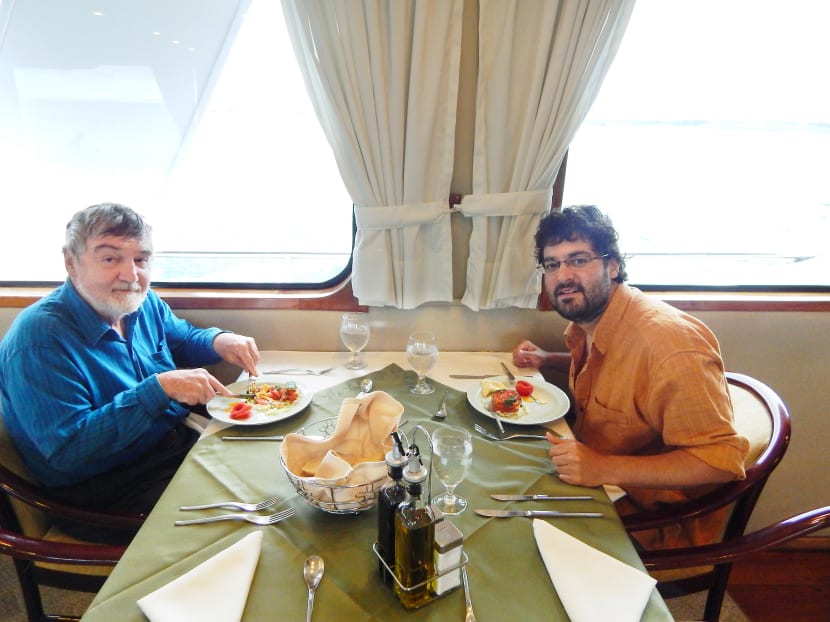THE BIG READ: Emotionally drained, caregivers yearn for support
SINGAPORE — Upon learning that his father’s cancer had relapsed, Mr Tejas Ewing made the difficult decision of leaving his job as a consultant for a London-based think-tank to return home.

Tejas Ewing and his father Iain Ewing travelled extensively, even after his father was diagnosed with cancer. Photo: Tejas Ewing
SINGAPORE — Upon learning that his father’s cancer had relapsed, Mr Tejas Ewing made the difficult decision of leaving his job as a consultant for a London-based think-tank to return home.
“Since I knew my father was not going to survive the cancer, in my mind, I knew I had to be there,” said Mr Ewing, 35. The only child in the family, he was raised by his father, after his parents divorced decades ago. In 2011, he came back to Singapore and became his father’s primary caregiver.
Over the next few years, Mr Ewing would help his father run their family business. As his father’s health declined, they decided to downsize the business — selling their office and operating out of home. On top of keeping the business going, Mr Ewing had to shuttle between his father’s medical appointments and chemotherapy sessions several times a week. “Many times, I felt like collapsing. I read up obsessively. Each appointment was only 15 minutes, and I had so many questions. But the doctors always let us ask all them, and they were willing to answer emails,” said Mr Ewing.
His father, who opted for palliative care in early 2013, died in October last year.
Mr Ewing returned to London last month. His experience is not uncommon: With smaller nuclear families, the toll on caregivers, who often have to juggle work and providing care, can be physically and emotionally draining.
Dr Cynthia Goh, head of the palliative medicine department at the National Cancer Centre Singapore, said: “Twenty five years ago, someone at home would give up their job to take care of a sick family member.” These days, fewer people are willing or able to sacrifice their careers, she added. This could lead to a strain on institutionalised services, she noted.
The rapidly ageing population has led to a surge in demand for palliative care services. Overall, there is inadequate social support to help cope with the emotional strain, experts said. There is no quick fix, given that the labour intensive industry remains plagued by a manpower crunch. Home palliative care is the most popular option among caregivers, compared to admitting their loved ones to hospices or palliative care wards in hospitals.
The high demand for home-based caregiving services here has resulted in a growing pool of service providers that includes non-profits and companies well established in the nursing home sector. In February, Singapore-based start-up Caregiver Asia launched a portal to match those seeking care services, such as at-home care, with qualified care professionals.
Hospitals and hospices here continue to provide support for family members of patients, even after the death of their loved ones.
Madam Eunice Ang, 84. whose husband died in 2012, said: “It’s been over three years since my husband died but I still meet up with the nurses and social workers who cared for him.”
Mdm Ang recounted how she learnt to care for her late husband during his fight with diabetes and cancer. Bit by bit, she learnt from the staff of Asisi Hospice, where her husband attended daycare once a week, how to bathe him and give insulin injections, for example.
HCA Hospice Care offers training and respite care programmes, such as camps, for patients and caregivers. “We also have a Sunflower Remembrance Day three times a year, where we bring back caregivers who had recent deaths in the family to share their experiences,” said Dr R. Akhileswaran, chief executive of HCA Hospice Care. “Our doctors and nurses will be around to observe how they’re coping.”






